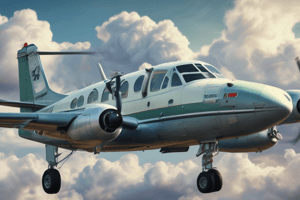Podcast
Questions and Answers
What is the significance of understanding medication use for pilots?
What is the significance of understanding medication use for pilots?
- It affects their performance while flying. (correct)
- It helps pilots determine weather patterns.
- It allows pilots to manage cargo efficiently.
- It ensures pilots can drive safely.
Why is it important for pilots to consult with aviation medical examiners?
Why is it important for pilots to consult with aviation medical examiners?
- To learn about new aviation technologies.
- To discuss necessary medications and their implications. (correct)
- To obtain flight route information.
- To administer first aid training.
In the event of a medical emergency onboard, which skill is essential for pilots?
In the event of a medical emergency onboard, which skill is essential for pilots?
- Communicating with air traffic control only.
- Navigating complex flight paths.
- Making informed decisions about diversion or continuation. (correct)
- Understanding weather conditions.
What risk must pilots understand when transporting hazardous materials like dry ice?
What risk must pilots understand when transporting hazardous materials like dry ice?
Why must pilots maintain health standards that meet or exceed FAA requirements?
Why must pilots maintain health standards that meet or exceed FAA requirements?
What role does aeromedical knowledge play in the dynamics of flight operations?
What role does aeromedical knowledge play in the dynamics of flight operations?
Which aspect of first aid is important for pilots to perform effectively?
Which aspect of first aid is important for pilots to perform effectively?
What knowledge is critical for pilots concerning over-the-counter medications?
What knowledge is critical for pilots concerning over-the-counter medications?
How can solid aeromedical knowledge impact a pilot's decision-making during flights?
How can solid aeromedical knowledge impact a pilot's decision-making during flights?
What is an example of a medication-related consideration for pilots?
What is an example of a medication-related consideration for pilots?
Pilots need to have a clear understanding of the implications of prescription medications on their performance.
Pilots need to have a clear understanding of the implications of prescription medications on their performance.
The only medications that require special consideration for pilots are illegal drugs.
The only medications that require special consideration for pilots are illegal drugs.
Pilots do not need to consider the waiting periods after taking medications as it does not affect flight safety.
Pilots do not need to consider the waiting periods after taking medications as it does not affect flight safety.
Pilots’ knowledge of carbon monoxide poisoning is unrelated to their flight duties.
Pilots’ knowledge of carbon monoxide poisoning is unrelated to their flight duties.
Maintaining personal health standards above FAA requirements can facilitate a smoother medical certification process for pilots.
Maintaining personal health standards above FAA requirements can facilitate a smoother medical certification process for pilots.
Pilots are trained to handle all medical emergencies without needing to consult cabin crew.
Pilots are trained to handle all medical emergencies without needing to consult cabin crew.
Knowledge of aeromedical principles has no impact on pilots' ability to respond during critical flight situations.
Knowledge of aeromedical principles has no impact on pilots' ability to respond during critical flight situations.
Transportation of hazardous materials like dry ice poses no risks as long as the cargo is securely packed.
Transportation of hazardous materials like dry ice poses no risks as long as the cargo is securely packed.
Pilots must have the ability to perform basic first aid in case of passenger medical emergencies.
Pilots must have the ability to perform basic first aid in case of passenger medical emergencies.
Pilots only need to consult with aviation medical examiners when applying for their first medical certificate.
Pilots only need to consult with aviation medical examiners when applying for their first medical certificate.
What should pilots do before flying after using certain medications?
What should pilots do before flying after using certain medications?
How can pilots address potential carbon dioxide poisoning when transporting dry ice?
How can pilots address potential carbon dioxide poisoning when transporting dry ice?
In an emergency medical event, what role does aeromedical knowledge play for pilots?
In an emergency medical event, what role does aeromedical knowledge play for pilots?
What is a key consideration regarding medication use for flight safety?
What is a key consideration regarding medication use for flight safety?
How does understanding health standards affect a pilot's certification process?
How does understanding health standards affect a pilot's certification process?
What role does coordination with cabin crew play for pilots during a medical emergency?
What role does coordination with cabin crew play for pilots during a medical emergency?
How is the intersection of aeromedical factors and flight operations characterized?
How is the intersection of aeromedical factors and flight operations characterized?
What is the implication of understanding medication interactions for pilots?
What is the implication of understanding medication interactions for pilots?
Why is prior consultation with aviation medical examiners important for pilots?
Why is prior consultation with aviation medical examiners important for pilots?
What basic skills should pilots possess to handle onboard medical emergencies?
What basic skills should pilots possess to handle onboard medical emergencies?
Flashcards are hidden until you start studying
Study Notes
Medication Use and Flight Safety
- Understanding the relationship between medication use and aeromedical risks is critical for pilots.
- Common medications like antihistamines and sleep aids can impair performance and judgment.
- High-altitude environments may exacerbate the effects of certain medications, leading to cumulative risks.
- Pilots must assess how medications impact reaction times and cognitive function, as these can endanger flight safety.
- A real-life case study from 1993 highlights the dangers of sedating antihistamines on flight safety.
FAA Guidelines
- The FAA provides a comprehensive list of approved medications for pilots, each with specific regulations.
- Knowing the FAA's stipulations is crucial to ensure compliance and maintain flight safety.
- Pilots should never introduce new medications close to flight duty times.
Consultation and Continuous Learning
- Consulting with an aeromedical examiner is necessary for advice on medication use.
- Staying updated with trusted medical sources ensures pilots remain informed about flight fitness and medication implications.
Physiological Challenges in Flight
- Pilots encounter physiological challenges such as hypoxia, spatial disorientation, and G-forces.
- Effective management of hypoxia may include oxygen supplementation and regular oxygen saturation checks.
- Instrument cross-check techniques are essential in mitigating spatial disorientation during flights.
Application of Aeromedical Knowledge
- Familiarizing oneself with oxygen systems and responding proactively to hypoxia symptoms is vital for flight safety.
- Implementing fatigue management strategies, such as adequate rest and hydration, is critical for long-duration flights.
- Pilots should practice instrument cross-checking to overcome visual illusions caused by disorientation.
Medical Emergencies and Hazardous Materials
- In emergencies, a firm grasp of aeromedical knowledge enables informed decisions, such as diverting flights or providing first aid.
- Transporting hazardous materials requires understanding the risks and ensuring proper ventilation to prevent exposure to harmful gases.
Personal Health and Certification
- Maintaining health standards that meet or exceed FAA requirements is essential for securing medical certification.
- Knowledge of potential medical issues can prevent complications that jeopardize flight safety and certification.
Conclusion
- Mastering aeromedical factors equips pilots to effectively navigate complex aviation scenarios, enhancing overall safety in the industry.
Aeromedical Factors in Aviation Safety
- Understanding the relationship between human physiology and aviation safety is crucial for pilots.
- Knowledge of medication use and its implications for flight safety is imperative for pilots.
- Common medications used by pilots include antihistamines, sleep aids, and dietary supplements, each carrying aeromedical risks.
- Potential side effects of medications can hinder pilot performance, such as degraded reaction times, impaired judgment, and drowsiness.
- Real-world scenarios illustrate risks; for example, use of cold medication may impair decision-making during severe weather conditions.
FAA Guidelines and Medication Management
- The Federal Aviation Administration (FAA) provides a list of approved medications for pilots, each with specific stipulations.
- Pilots must be familiar with FAA regulations to ensure safety for themselves and passengers.
- Strategies for managing medication include monitoring dosages and timings, avoiding new medications close to flight duties, and consulting aeromedical examiners for guidance.
Importance of Maintaining Health
- Regular updates from trusted medical sources about medication impacts and aeromedical trends are essential for pilots.
- Recommendations for pilots encompass frequent rest, a nutritious diet, and routine physical activity to combat aeromedical challenges.
Application of Aeromedical Knowledge
- Practical application of aeromedical knowledge enhances decision-making in flight operations.
- Awareness of hypoxia risks at high altitudes prompts preventive measures, such as using supplemental oxygen.
- Pilot fatigue management strategies include adequate rest, proper nutrition, hydration, and in-flight movement.
- Understanding instrument flying and cross-check techniques combats spatial disorientation, encouraging reliance on instruments rather than sensory cues.
Emergency Situations and Hazard Management
- Familiarity with emergency protocols enables informed decisions about flight diversions in medical emergencies on board.
- Pilots should be prepared to handle hazardous materials safely, recognizing risks such as carbon dioxide exposure from dry ice.
Certification and Personal Health
- Pilots must maintain health standards that meet or exceed FAA requirements for smooth medical certification.
- Knowledge of aeromedical factors equips pilots to anticipate and respond effectively to varying scenarios, enhancing the overall safety of aviation operations.
Future Learning
- Upcoming discussions will focus on "Stress, Fatigue, and Flight Safety," emphasizing the psychological dimensions of aviation physiology.
Pilot Medication Management
- Even harmless medications can pose risks in aviation, jeopardizing pilots and passengers.
- The FAA has a list of approved medications, with specific guidelines and stipulations for pilot use.
- Pilots must be well-versed in these regulations to prioritize safety on flights.
- Recommended practices include meticulous dosage management, cautious timing of medication introduction, and avoiding new medications before flights.
- Consult an aeromedical examiner if uncertain about medication effects to ensure flying fitness.
- Staying updated with medical sources is essential for understanding medication developments and safety advice.
Physiological Challenges in Flight
- Pilots face unique physiological challenges during flights such as hypoxia, spatial disorientation, and G-forces.
- Recognizing these challenges is crucial; however, effective management is the key skill.
- Hypoxia can occur at high altitudes due to decreased oxygen levels, necessitating strategies like oxygen supplementation.
- Familiarity with oxygen mask operation is essential for emergency preparedness.
- Spatial disorientation can lead to a loss of positional awareness; employing the IIMSAFE checklist helps maintain situational context.
- G-forces can affect pilot perception and performance, emphasizing the importance of smooth maneuvering techniques to minimize impact.
Application of Aeromedical Knowledge
- Practical application of aeromedical principles enhances safety during flight operations.
- Awareness of hypoxia risks leads to preventive measures like using supplemental oxygen above safe altitudes and monitoring acclimatization.
- Identifying early signs of hypoxia allows for immediate corrective actions, such as descending to a lower altitude.
- Fatigue management strategies enhance performance, including obtaining adequate rest and maintaining hydration during long flights.
- In-flight movement and strategic napping may mitigate fatigue effects.
- Pilots should use instrument cross-check techniques to combat spatial disorientation, especially in low visibility conditions.
Medication Use and Emergency Preparedness
- Understanding the effects of medications, both prescription and over-the-counter, is critical for maintaining pilot performance.
- Awareness of required waiting periods and prohibitive medication laws is vital for safe operations.
- Consulting with aviation medical examiners regarding medication implications is essential.
- In emergencies, a solid aeromedical foundation aids pilots in deciding whether to divert flights or manage passenger medical issues effectively.
- Knowledge of hazardous material transport, such as dry ice, includes awareness of ventilation needs to prevent carbon monoxide poisoning.
Maintaining Flight Safety
- Pilots should uphold health standards that meet or exceed FAA requirements for smooth medical certification.
- A strong grasp of aeromedical principles enhances a pilot's ability to address the complexities of flight environments effectively.
- Continuous education in aeromedical factors contributes significantly to overall aviation safety and pilot performance.
Studying That Suits You
Use AI to generate personalized quizzes and flashcards to suit your learning preferences.




